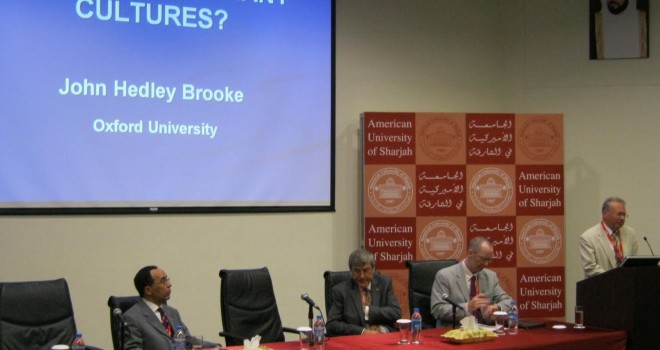
Muslim Astronomer Weighs In On The Religion-Science Debate
Over at Big Questions Online, astronomer Nidhal Guessoum asks Why Should Scientists Care About Religion?
“As a Muslim scientist,” he writes, “I spend much time and expend much energy trying to convince Muslims and other believers to take modern science seriously, with all its methodology and results – and its limits.”
But:
“The reverse exercise, to try to convince scientists and other educated people that religion should be taken seriously, is much more difficult, for several reasons. First, there is an intrinsic asymmetry in the relationship: science, in addition to being a methodology and a discovery process, is able to ascertain a vast array of results and present whole swaths of established knowledge. Today, no one can doubt that matter is made of atoms and particles, that life evolved and produced a vast tree of species, or that the universe has expanded from a singularity and is today made up of hundreds of billions of galaxies, each made up of hundreds of billions of stars, many/most of which have planets around them, etc.
On the other hand, “religion” (I’ll get to definitions shortly), while having developed branches of knowledge, with methodologies and references, cannot claim to present realms of established knowledge. Still, “religion,” in some forms and from some perspectives, can present an ensemble of highly respectable and beneficial ideas that even hardline scientists can appreciate and find useful, for humanity if not for themselves.”
I’ve been a little surprised that his essay hasn’t gotten more attention in the science blogosphere, as his last sentence is one that –in some quarters–usually prompts strongly negative responses.*
Guessoum is a professor at the American University of Sharjah, in the United Arab Emirates. While his argument that science and religion are not fundamentally irreconcilable may not sway many scientists on this side of the Atlantic, he does raise some interesting questions.
For example:
“Should “Religion” and “Science” just be considered as totally separate “magisteria” (as in Stephen Jay Gould’s ‘NOMA’, the Non-Overlapping Magisteria) or should one attempt to relate the two in some way?
Will “wonder and awe” come to replace “religion and spirituality” in the future, or does “religion” have some core values that will always be attractive to people?”
To the extent that religion is defined by a set of practices, customs and rituals, I think the answer to the second question is almost certainly no. From an anthropological perspective, the religious impulse seems to have been hardwired from the beginning.
As for Gould’s NOMA, it was never a very compelling model for an accommodation between science and religion, either for scientists deeply skeptical about the value of religion’s influence in society, or for theologians skeptical of the notion that science has nothing to contribute to our understanding of moral and philosophical questions.
*Author’s disclosure: The Templeton Foundation sponsors the Big Questions blog, and formerly sponsored a religion and science journalism fellowship, of which I was a beneficiary in 2010.
By John Farrell.
Follow me on Facebook and Twitter. Subscribe to my Vimeo Channel.

